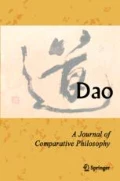Abstract
A major reason that Confucius should matter to Western ethical philosophers is that some of his concerns are markedly different from those most common in the West. A Western emphasis has been on major choices that are treated in a decontextualized way. Confucius’ emphasis is on paths of life, so that context matters. Further, the nuances of personal relations get more attention than is common (with the exception of feminist ethics) in Western philosophy. What Confucius provides is a valuable aid in arriving at a more balanced sense of what ethics is concerned with. It also allows us to realize the importance of sensitivity to particulars. Finally, it highlights the importance of style (as well as the content of what is chosen) in behavior, and the ways in which relations with family and friends can connect with choices in a wider “public” sphere.
Similar content being viewed by others
References
Abbott, Thomas Kingsmill. 1898. “Memoir of Kant.” In Kant’s Critique of Practical Reason and Other Works On the Theory of Ethics. London: Longmans Green
Analects. 2003. Trans. by Edward Slingerland. Indianapolis: Hackett.
Baier, Annette. 1986. “The Ambiguous Limits of Desire.” In Ways of Desire, edited by Joel Mark. Chicago: Precedent.
Boswell, James. 1891. Life of Johnson, edited by George Birkbeck Hill. 2 vols. New York: Harper & Brothers.
De Bary, William Theodore. 2001. Nobility and Civility: Asian Ideals of Leadership and The Common Good. Cambridge, MA: Harvard University Press.
Fingarette, Herbert. 1972. Confucius—The Secular as Sacred. New York: Harper and Row.
Hume, David. 1975. Enquiry Concerning the Principles of Morals. In Enquiries, edited by L. A. Selby-Bigge, revised by P. H. Nidditch. Oxford: Clarendon Press.
Kupperman, Joel J. 2005. “Morality, Ethics, and Wisdom.” In A Handbook of Wisdom: Psychological Perspectives, edited by Robert J. Sternberg and Jennifer Jordan. Cambridge: Cambridge University Press.
Mill, John Stuart. 1978. On Liberty, edited by Elizabeth Rappaport. Indianapolis: Hackett.
_____. 1979. Utilitarianism, ed. by George Sher. Indianapolis: Hackett.
Newson, Elizabeth. 1978. “Unreasonable Care: The Establishment of Selfhood.” In Human Values, edited by Geoffrey Vesey. Sussex: Harvester Press.
Williams, Bernard. 1975. Ethics and the Limits of Philosophy. London: Fontana.
Wittgenstein, Ludwig. 1953. Philosophical Investigations, edited by G. E. M. Anscombe. London: Macmillan
Author information
Authors and Affiliations
Corresponding author
Rights and permissions
About this article
Cite this article
Kupperman, J.J. Confucian Civility. Dao 9, 11–23 (2010). https://doi.org/10.1007/s11712-009-9154-5
Published:
Issue Date:
DOI: https://doi.org/10.1007/s11712-009-9154-5




